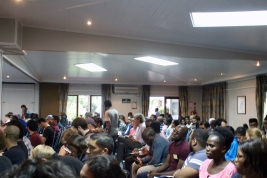
The 13th SARAO Post-graduate Bursary Conference was held in Port Elizabeth from Nov. 26th-30th, 2018. SARAO is the South African Radio Astronomical Observatory and they hold this conference every year for post-graduate students (thus the name) and post-doctoral fellows that they fund. Because my funding ultimately comes through SARAO in a very roundabout way, I was privileged to attend this fantastic conference conference. It was an amazing week full of wonderful science. I thought it would be worthwhile giving a brief overview of my thoughts about the conference itself.
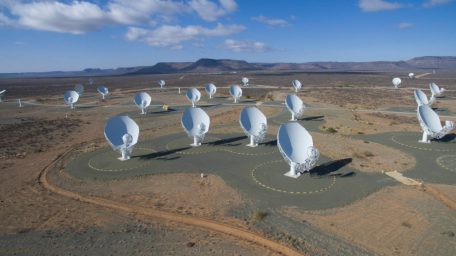
One of the big focuses of this conference is that MeerKAT is working! MeerKAT, which is designed and built by South Africans, is a world leading instrument. The early science results and images coming out of it are stunning. There was not a single person at the conference who wasn’t captivated by what it is finding. I even started thinking about ways I could use MeerKAT, and I’ve never done any observations and have no idea how to do anything with radio data! The advent of the MeerKAT era has begun, and I cannot overstate how promising the future looks!
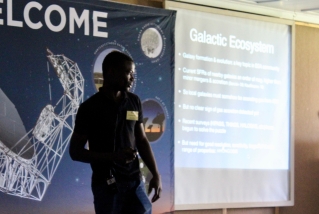
For the South African context, I think it’s really important to stress how proud South Africa should be about what they have built. Astronomers today try to focus on light in all wavelengths (and are trying to figure out how to use gravitational waves and neutrinos as well, but that’s a story for another article). MeerKAT is now one of the premier radio telescopes and scientists from around the world will be coming here to ask for South Africans to help them solve the deepest questions we have. MeerKAT will tell us about general relativity, how galaxies form and evolve, gravitational waves, dark matter, dark energy, and the origin and structure of the Universe as a whole! Personally, I feel incredibly lucky to be here at this time.

South Africans should also be proud of the scientists and engineers that they are producing. As I mentioned earlier, this conference is focused on post-graduate students and post-doctoral fellows and they are inspiring. The new techniques they are developing are ground-breaking, from processing massive amounts of data, to detecting and characterizing the smallest of signals, to finding new ways of looking at the Universe. I don’t often think about it in these terms, but it is absolutely right to say that they are advancing humanity’s knowledge in leaps and bounds. And not just in terms of scientific knowledge (rest assured they are doing that), but also in practical ways. Many of the techniques developed by these students can be modified for industry. Those who choose to leave pursue careers in the private sector will be bring new, game changing tools with them!
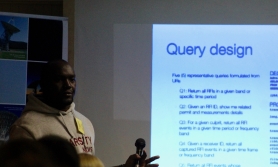
A special mention must be made here about the SARAO HCD (Human Capital Development) program. This program was initiated in 2005 and designed to promote interest and expertise in science, engineering, and math among South African students. It has provided financial support to over 1000 individuals since its inception, bringing many them all the way from undergrad through to the end of their Doctorates. It also provides resources to schools in the Karoo and is now supporting students who are studying to be educators. The success of this bursary conference and the high quality of the science that was shared there speaks to the efficacy of this program!
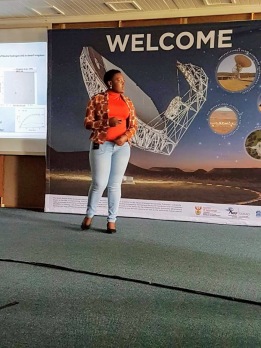
Returning to the conference itself, this was one of the better ones. We were located at Pine Lodge in Port Elizabeth, which is a little bit out of the city. It’s a beautiful venue, and, because of it being a bit out of the way most people stayed around and attended all the sessions. By contrast, a lot of the conferences I’ve gone to will have people starting to skip sessions midway through the week for a variety of reasons (working on their own research, telecoms, preparing their talks, etc.). The talks were very good and the science was, as I said, amazing.

The conference was a general conference, which are a little bit different than those that focus on specific questions/fields. In a general conference, it might be more difficult to fully engage with all the results presented because it’s not always what you are most interested in. However, general conferences allow you to hear a lot more about advances in astronomy. That’s part of what made this conference so exciting! There were a few hundred scientists and engineers together last week, all engaging with each other and with big questions. This happened during talks, questions periods and panel discussions. More than that, it happened during the breaks between sessions, as people digested what they heard. I saw more than a few new projects being discussed and designed over lunches and dinners.

That liveliness has actually re-energized me. I’m more excited for my own work (which I was excited by before), than I was before the conference. But more than that, I’m excited for the science that will be coming out of South Africa over the next few years. The pace of discovery is going to be absolutely amazing! And once again, South Africa is going to be the place to be for world changing science!
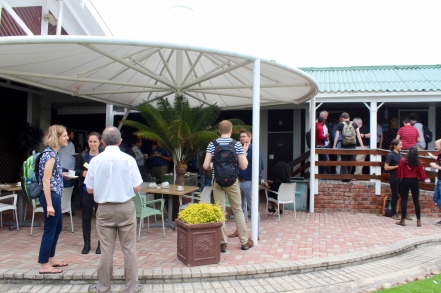
Thank you to Dr. Delhaize and Dr.Glowacki for their help editing this post!
